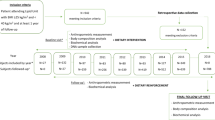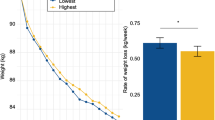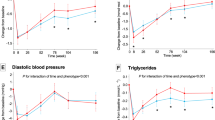Abstract
Aims:
Over 75% of obese subjects fail to maintain their weight following weight loss interventions. We aimed to identify phenotypic and genetic markers associated with weight maintenance/regain following a dietary intervention.
Subjects and methods:
In the 2-year Dietary Intervention Randomized Controlled Trial, we assessed potential predictors for weight changes during the ‘weight loss phase’ (0–6 months) and the ‘weight maintenance/regain phase’ (7–24 months). Genetic variation between study participants was studied using single-nucleotide polymorphisms in the leptin gene (LEP).
Results:
Mean weight reduction was −5.5% after 6 months, with a mean weight regain of 1.2% of baseline weight during the subsequent 7–24 months. In a multivariate regression model, higher baseline high-molecular-weight adiponectin was the only biomarker predictor of greater success in 0- to 6-month weight loss (β=−0.222, P-value=0.044). In a multivariate regression model adjusted for 6-month changes in weight and various biomarkers, 6-month plasma leptin reduction exhibited the strongest positive association with 6-month weight loss (β=0.505, P-value<0.001). Conversely, 6-month plasma leptin reduction independently predicted weight regain during the following 18 months (β=−0.131, P-value<0.013). Weight regain was higher among participants who had a greater (top tertiles) 6-month decrease in both weight and leptin (+3.4% (95% confidence interval 2.1–4.8)) as compared with those in the lowest combined tertiles (+0.2% (95% confidence interval −1.1 to 1.4)); P-value<0.001. Weight regain was further significantly and independently associated with genetic variations in LEP (P=0.006 for both rs4731426 and rs2071045). Adding genetic data to the phenotypic multivariate model increased its predictive value for weight regain by 34%.
Conclusion:
Although greater reduction in leptin concentrations during the initial phase of a dietary intervention is associated with greater weight loss in the short term, plasma leptin reduction, combined with the degree of initial weight loss and with genetic variations in the LEP gene, constitutes a significant predictor of subsequent long-term weight regain.
This is a preview of subscription content, access via your institution
Access options
Subscribe to this journal
Receive 12 print issues and online access
$259.00 per year
only $21.58 per issue
Buy this article
- Purchase on Springer Link
- Instant access to full article PDF
Prices may be subject to local taxes which are calculated during checkout


Similar content being viewed by others
References
Flegal KM, Graubard BI, Williamson DF, Gail MH . Excess deaths associated with underweight, overweight, and obesity. JAMA 2005; 293: 1861–1867.
Knowler WC, Barrett-Connor E, Fowler SE, Hamman RF, Lachin JM, Walker EA et al. Reduction of the incidence of type 2 diabetes with lifestyle intervention or metformin. N Engl J Med 2002; 346: 393–403.
Wood PD, Stefanick ML, Dreon DM, Frey-Hewitt B, Garay SC, Williams PT et al. Changes in plasma lipids and lipoproteins in overweight men during weight loss through dieting as compared with exercise. N Engl J Med 1988; 319: 1173–1179.
Elmer PJ, Grimm Jr R, Laing B, Grandits G, Svendsen K, Van Heel N et al. Lifestyle intervention: results of the Treatment of Mild Hypertension Study (TOMHS). Prev Med 1995; 24: 378–388.
Whelton PK, Appel LJ, Espeland MA, Applegate WB, Ettinger Jr WH, Kostis JB et al., on behalf of TONE Collaborative Research Group. Sodium reduction and weight loss in the treatment of hypertension in older persons: a randomized controlled trial of nonpharmacologic interventions in the elderly (TONE). JAMA 1998; 279: 839–846.
Stevens VJ, Obarzanek E, Cook NR, Lee IM, Appel LJ, Smith West D et al., Trials for the Hypertension Prevention Research Group. Long-term weight loss and changes in blood pressure: results of the trials of hypertension prevention, phase II. Ann Intern Med 2001; 134: 1–11.
Tuomilehto J, Lindstrom J, Eriksson JG, Valle TT, Hämäläinen H, Ilanne-Parikka P et al., on behalf of the Finnish Diabetes Prevention Study Group. Prevention of type 2 diabetes mellitus by changes in lifestyle among subjects with impaired glucose tolerance. N Engl J Med 2001; 344: 1343–1350.
Jeffery RW, Drewnowski A, Epstein LH, Stunkard AJ, Wilson GT, Wing RR et al. Long-term maintenance of weight loss: current status. Health Psychol 2000; 19 (Suppl 1): 5–16.
Tsai A, Wadden T . Systematic review: an evaluation of major commercial weight loss programs in the United States. Ann Intern Med 2005; 142: 56–66.
Dansinger ML, Tatsioni A, Wong JB, Chung M, Balk EA . Meta-analysis: the effect of dietary counseling for weight loss. Ann Intern Med 2007; 147: 41–50.
Serdula MK, Mokdad AH, Williamson DF, Galuska DA, Mendlein JM, Heath GW . Prevalence of attempting weight loss and strategies for controlling weight. JAMA 1999; 282: 1353–1358.
Leibel R, Rosenbaum M, Hirsch J . Changes in energy expenditure resulting from altered body weight. N Engl J Med 1995; 332: 621–628.
Rosenbaum M, Goldsmith R, Bloomfield D, Magnano A, Weimer L, Heymsfield S et al. Low-dose leptin reverses skeletal muscle, autonomic, and neuroendocrine adaptations to maintenance of reduced weight. J Clin Invest 2005; 115: 3579–3586.
Uusitupa M . Gene-diet interaction in relation to the prevention of obesity and type 2 diabetes: evidence from the Finnish Diabetes Prevention Study. Nutr Metab Cardiovasc Dis 2005; 15: 225–233.
Shai I, Schwarzfuchs D, Henkin Y, Shahar DR, Witkow S, Greenberg I et al., for the Dietary Intervention Randomized Controlled Trial (DIRECT) Group. Weight loss with a low-carbohydrate, Mediterranean, or low-fat diet. N Engl J Med 2008; 359: 229–241.
Hobbs HH, Brown MS, Goldstein JL, Russell DW . Deletion of exon encoding cysteine-rich repeat of LDL receptor alters its binding specificity in a subject with familial hypercholesterolemia. J Biol Chem 1986; 261: 13114–13120.
Wigginton JE, Cutler DJ, Abecasis GR . A note on exact tests of Hardy-Weinberg equilibrium. Am J Hum Genet 2005; 76: 887–893.
Lake SL, Lyon H, Tantisira K, Silverman EK, Weiss ST, Laird NM et al. Estimation and tests of haplotype-environment interaction when linkage phase is ambiguous. Hum Hered 2003; 55: 56–65.
Sinnwell JP, Schaid DJ . Haplo.stats: Statistical analysis of haplotypes with traits and covariates when linkage phase is ambiguous. R package version 1.1.1, April 2004.
Barrett JC, Fry B, Maller J, Daly MJ . Haploview: analysis and visualization of LD and haplotype maps. Bioinformatics 2005; 21: 263–265.
Benjamini Y, Hochberg Y . Controlling the false discovery rate: a practical and powerful approach to multiple testing. J R Stat Soc 1995; 57: 289–300.
Martin SS, Qasim A, Reilly MP . Leptin resistance: a possible interface of inflammation and metabolism in obesity-related cardiovascular disease. J Am Coll Cardiol 2008; 52: 1201–1210.
MacLean PS, Higgins JA, Jackman MR, Johnson GC, Felming-Elder BK, Wyatt HR et al. Peripheral metabolic responses to prolonged weight reduction that promote rapid, efficient regain in obesity-prone rats. Am J Physiol Regul Integr Comp Physiol 2006; 290: R1577–R1588.
Rosenbaum M, Vandenborne K, Goldsmith R, Simoneau JA, Heymsfield S, Joanisse DR et al. Effects of weight change on skeletal muscle work efficiency in human subjects. Am J Physiol Regul Integr Comp Physiol 2003; 285: R183–R192.
Scarpace PJ, Matheny M, Zhang Y, Shek EW, Prima V, Zolotukhin S et al. Leptin-induced leptin resistance reveals separate roles for the anorexic and thermogenic responses in weight maintenance. Endocrinology 2002; 143: 3026–3035.
Filozof CM, Murúa C, Sanchez MP, Brailovsky C, Perman M, Gonzalez CD et al. Low plasma leptin concentration and low rates of fat oxidation in weight-stable post-obese subjects. Obes Res 2000; 8: 205–210.
Rosenbaum M, Sy M, Pavlovich K, Leibel RL, Hirsch J . Leptin reverses weight loss-induced changes in regional neural activity responses to visual food stimuli. J Clin Invest 2008; 118: 2583–2591.
Vogels N, Westerterp-Plantenga MS . Successful long-term weight maintenance: a 2-year follow-up. Obesity 2007; 15: 1258–1566.
Mavri A, Stegnar M, Sabovic M . Do baseline serum leptin levels predict weight regain after dieting in obese women? Diabetes Obes Metab 2001; 3: 293–296.
Montague CT, Farooqi IS, Whitehead JP, Soos MA, Rau H, Wareham NJ et al. Congenital leptin deficiency is associated with severe early-onset obesity in humans. Nature 1997; 387: 903–908.
Strobel A, Issad T, Camoin L, Ozata M, Strosberg AD . A leptin missense mutation associated with hypogonadism and morbid obesity. Nat Genet 1998; 18: 213–215.
Le Stunff C, Le Bihan C, Schork NJ, Bougneres P . A common promoter variant of the leptin gene is associated with changes in the relationship between serum leptin and fat mass in obese girls. Diabetes 2000; 49: 2196–2200.
Li WD, Reed DR, Lee JH, Xu W, Kilker RL, Sodam BR et al. Sequence variants in the 5′ flanking region of the leptin gene are associated with obesity in women. Ann Hum Genet 1999; 63: 227–234.
Mammes O, Betoulle D, Aubert R, Herbeth B, Siest G, Fumeron F . Association of the G-2548A polymorphism in the 5′ region of the LEP gene with overweight. Ann Hum Genet 2000; 64: 391–394.
Jiang Y, Wilk JB, Borecki I, Williamson S, DeStefano AL, Xu G et al. Common variants in the 5′ region of the leptin gene are associated with body mass index in men from the National Heart, Lung, and Blood Institute Family Heart Study. Am J Hum Genet 2004; 75: 220–230.
Karvonen MK, Pesonen U, Heinonen P, Laakso M, Rissanen A, Naukkarinen H et al. Identification of new sequence variants in the leptin gene. J Clin Endocr Metab 1998; 83: 3239–3242.
Gaukrodger N, Mayosi BM, Imrie H, Avery P, Baker M, Connell JM et al. A rare variant of the leptin gene has large effects on blood pressure and carotid intima-medial thickness: a study of 1428 individuals in 248 families. J Med Genet 2005; 42: 474–478.
Peltonen L, McKusick VA . Genomics and medicine: dissecting human disease in the postgenomic era. Science 2001; 291: 1224–1229.
Acknowledgements
We are thankful to the 322 Dietary Intervention Randomized Controlled Trial participants for their consistent cooperation. Sources of support: (1) The Israeli Ministry of Health, Chief Scientist Office (grants received by Drs Shai, Schwarzfuchs and Tirosh, Israel); (2) DFG grant (KFO 152, grants received by Drs Blüher and Stumvoll, Germany); (3) Sarah and Moshe Mayer Foundation for Research (grant received by Prof. Leitersdorf, Israel); and (4) The Dr Robert C and Veronica Atkins Research Foundation. This foundation was not involved in any stage of the design, conduct or analysis of the study and had no access to the study results before publication.
Author information
Authors and Affiliations
Corresponding author
Ethics declarations
Competing interests
The authors declare no conflict of interest.
Additional information
Supplementary Information accompanies the paper on International Journal of Obesity website
Supplementary information
Rights and permissions
About this article
Cite this article
Erez, G., Tirosh, A., Rudich, A. et al. Phenotypic and genetic variation in leptin as determinants of weight regain. Int J Obes 35, 785–792 (2011). https://doi.org/10.1038/ijo.2010.217
Received:
Revised:
Accepted:
Published:
Issue Date:
DOI: https://doi.org/10.1038/ijo.2010.217
Keywords
This article is cited by
-
Pomelo fruit wastes are potentially valuable antioxidants, anti-inflammatories, antihypertensives, and antihyperglycemics
Horticulture, Environment, and Biotechnology (2021)
-
Interplay between diet and genetic susceptibility in obesity and related traits
Frontiers of Medicine (2018)
-
Acute and short-term effects of caloric restriction on metabolic profile and brain activation in obese, postmenopausal women
International Journal of Obesity (2016)
-
Baseline characteristics associated with different BMI trajectories in weight loss trials: a case for better targeting of interventions
European Journal of Clinical Nutrition (2016)
-
Gene–Diet Interaction on Body Weight Maintenance
Current Nutrition Reports (2015)



